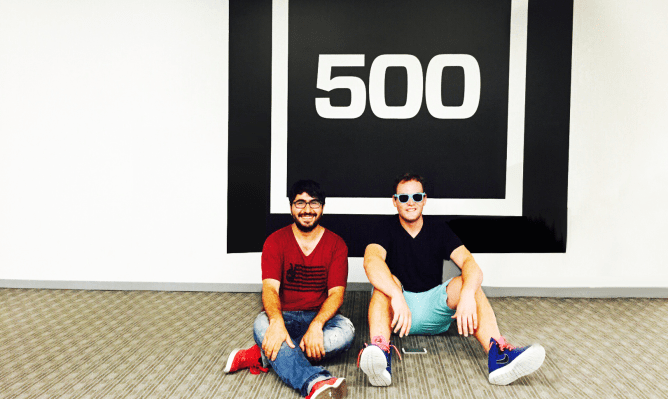500 Startups, known for its work as a startup accelerator, now hopes to incubate its own ideas in-house and spin them off into new companies.
Called 500 Labs, it’s a new attempt at finding interesting ideas that might turn out to be good investments. 500 Startups essentially brings in developers and entrepreneurs in residence, giving them the resources to play around with ideas until they find one that sticks. It’s not a particularly new model — there are others like Betaworks and Andy Rubin’s hardware-centric Playground.
500 Startups hopes to differentiate itself as a startup incubator by giving founders and developers the ability to lean on its large growth marketing team. McClure argues that it has one of the largest growth marketing teams in the VC community, giving it the ability to help spark an initial seed audience for projects that will hopefully start taking off on its own in addition to paid acquisition.
You can think of it as a sort of extension of the entrepreneur-in-residence program that many VC firms have in the Valley. 500 Labs pairs up potential candidates based on their qualifications — a developer with a general manager, for example — and gives them room to try out a bunch of ideas. They’re salaried, which means it carries less risk than running off to start a new company off an idea that may be destined to fail, and gives creators room to rapidly try new ideas.
500 Startups expects to be working on around 10 projects at a time, with 3 or 4 of them being spun into companies if they exhibit some potential and high growth. 500 Labs candidates have the benefit of leaning on the 500 Startups infrastructure to handle difficult early-stage tasks like recruiting and marketing, and creating paid acquisition campaigns, Selcuk Atli — one of the leads on the program, along with Dom Coryell — said. That marketing team is also constantly looking for new avenues, like potentially AR and VR in the future, 500 Startups co-founder Dave McClure said.
“As much as startups have high attrition rates, founders have experience in a particular domain have a higher success rate,” McClure said. “It’s a different model, it’s model has been proven to work in other scenarios. I think if you [mess] it up enough times you’re going get good at doing it.”
For creators, the bar for potential investments will be even higher than the one startups face when looking to apply to the firm’s accelerator program, McClure said. That’s partly because the founders that are working on these projects are expected to have the experience and skills to help cultivate strong ideas and grow them. For example, for an app-based model to be successful, McClure said the firm expects something in the tens to hundreds of thousands of downloads before it’s considered to be spun out into a new company.
A couple of example projects that 500 Labs might spin up would be e-commerce or marketplace services, and other online software-based services that have a natural growth arc that can be supplemented by 500 Startups’ growth team. The firm is also looking into enterprise productivity tools, as an example of potential ideas it might explore in the enterprise space.
“We have a pretty broad area, but we’re trying to confine all these things under the mobile umbrella so we can tactically share resources,” Selcuk said. “If you’re working on the mobile, you’re working on app store optimization for example. We feel that’s an advantage to have not so much of a narrow focus but a broad enough focus so we can share resources.”
Those founders don’t necessarily have to be the original creators of successful products — they could also be top-level lieutenants at those companies, Atli said. “I think we’re probably looking at core disciplines in engineering, design and marketing areas we’re going after,” Atli said. “That might not have been the founders of previous companies, it could be senior principals. Kind of like the Facebook and PayPal mafias, we’d like to find successful companies with a second level of experience who might want to start things.”
The concept was always in the back of McClure and his team’s mind, but it was over a round of drinks and hookah that Selcuk and McClure finally sealed the deal. McClure said he was basically waiting for the resources and the right personnel to finally roll the project out. Initially, the Labs model will focus on remote locations like Waterloo and Toronto — places with a bevy of tech talent that would have otherwise been recruited by the now-dead (or basically dead) BlackBerry — but the idea is to constantly give them a presence in Silicon Valley.
“When companies get funded they can move anywhere,” Atli said. “We found pockets of talent in interesting and amazing places. Vietnam, Waterloo, Berlin, Istanbul, there’s talent all over the world but there isn’t always much access to capital. Combining a Silicon Valley HQ with access to other communities all over the world, we think we can be really effective.”
Of course, all this would be moot if it weren’t a successful outcome for the firm as well. 500 Startups is aiming that founders will have double-digit point ownership of the companies that are spun out of the incubator, but the overall ownership structure is still being worked out between the team and founders.
McClure and Atli shy away from comparisons to other accelerators and incubators, though it’s hard not to draw analogies between a program like 500 Labs and Betaworks. But McClure argues that with its network of thousands of founders, it can lean on that network for potential candidates for 500 Labs that those other firms might not have access.
